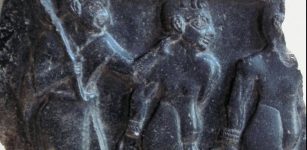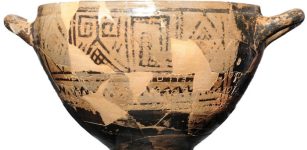Apollo Punished Rivals For Their Extraordinary Musical Skills
A. Sutherland - AncientPages.com - Among the Olympian Gods, Apollo is the most complex figure in all his aspects.
As central to Greek culture, he has been recognized as a god of music and dance, truth and prophecy, art, healing and diseases, the Sun and light, knowledge, poetry, and archery.
Ancient Roman statue of God Apollo playing a lire. Image credit: Adobe Stock - giorgio
He was also the god of the Oracle and the patron saint of the Delphi. Popular among the gods, Apollo was also loved by ordinary people of ancient Greece.
Though renowned in the art of music, it does not mean he had no rivals who considered themselves equal to him in this respect. He had a few individuals who challenged him to compete in a musical contest.
One of them was Marsyas, and another was Pan. Marsyas was a Satyr who had picked up the flute, which the goddess Athena had thrown away in disgust. After being touched by the goddess's lips, he found that the flute played itself most charmingly.
The Satyr, Marsyas, was a great lover of music and much beloved on this account by all the elf-like creatures living in the glens and woods. He was so intoxicated with the sound of the flute and its discovery that he mindlessly challenged Apollo to compete with him in a musical contest.
 Apollo and Marsyas. House of Aion Mosaic, Paphos. Image credit: Mgiganteus - CC BY-SA 3.0
Apollo and Marsyas. House of Aion Mosaic, Paphos. Image credit: Mgiganteus - CC BY-SA 3.0
The challenge was accepted, and the Muses were chosen referees. It was also decided that the unsuccessful competitor should suffer the cruel punishment of being flayed alive.
For a long time, the merits of both claimants remained so equally balanced that it was impossible to award the palm of victory to either. Finally, Apollo was the one who resolved to conquer by adding the sweet tones of his melodious voice to the strains of his magical lyre.
The result was that he won the competition, but would he win the contest without engaging his incredible voice in his performance?
Marsyas was defeated and very sad. He suddenly realized that he must undergo the terrible penalty of dying in torture. 'Apollo took the cruelest revenge on Marsyas: flaying him alive and nailing his skin to a pine (or a planetree). A legend says that many of Marsyas' companions cried, including the Satyrs and Dryads. Unhappy at his terrible fate, they had gathered all their tears together and created a river in Phrygia, which is still known today by the name of Marsyas.
Pan, the god of shepherds, declared that he could play even more skillfully on his flute of seven reeds than the god Apollo on his lyre. This contest, widely known among the Olympians, also had another competitor. After challenging Apollo, this competitor survived unharmed, but the third rival to Apollo's extraordinary musical skills was Cinyras, king of Cyprus and a great flutist.
Apollo and King Midas. Painting by Simon Floquet, circa 1634.Photographer: Sotheby's – Public Domain
Tradition has it that Cinyras was revered as the creator of art and musical instruments, especially the flute. In one source, he is also mentioned for his physical beauty. The legend says that the king of Cyprus was also an excellent singer, and he posed a musical challenge to Apollo and tested his abilities.
Fate, unfortunately, was not kind to him. His life ended dramatically as the god Mars, who in Greek was the mythological world is identified with the god Ares took Cinyras’ life.
This intriguing contest proceeded, and when it finished, Apollo was pronounced the winner by the all involved judges.
However, Midas, king of Phrygia, disagreed with the judges' decision. He was the only judge who thought that Marsyas was a better player.
Perhaps he had the bad taste to prefer the rather vulgar and primitive tones of the Pan's pipe to Apollo's lyre's enhanced and sweet melodies. Midas, the only judge in the contest, was punished due to his most unusual attitude toward the music of Apollo. Judging him as a stupid man who lacked human ears for music, Apollo gave him the ears of an ass.
Horrified at being disfigured, the Phrygian king had to act quickly to disguise his appearance and disgrace, so he used a Phrygian cap, turban, or another headdress. It was also important that his private barber could keep this most painful secret forever.
Therefore, the man was bribed with gifts of great value, never to reveal the king's secret. Finding that he could not keep the secret any longer, he went out into a meadow, dug a hole in the ground, whispered the story into it:
“‘King Midas has ass’s ears!’ Then he filled up the hole, and went away, at peace with himself until a reed sprouted from the bank and whispered the secret to all who passed. When Midas learned that his disgrace had become public knowledge, he condemned the barber to death, drank bull’s blood, and perished miserably.” 1
Later, a thick bed of reeds sprang up from the covered-up hole and began whispering the story, saying, "King Midas has an ass's ears."
Some sources said that Midas killed himself by drinking the blood of an ox.
Written by – A. Sutherland - AncientPages.com Senior Staff Writer
Copyright © AncientPages.com All rights reserved. This material may not be published, broadcast, rewritten or redistributed in whole or part without the express written permission of AncientPages.com
Expand for referencesReferences:
- Graves, R. The Greek Myths
Walsh, Nicos. Greek Mythology
Fritz Graf, Apollo
More From Ancient Pages
-
 Evidence Of A Lost Advanced Ancient Civilization In Cincinnati – Remarkable Artifacts And Ancient Bodies That Shouldn’t Exist
Artifacts | May 8, 2018
Evidence Of A Lost Advanced Ancient Civilization In Cincinnati – Remarkable Artifacts And Ancient Bodies That Shouldn’t Exist
Artifacts | May 8, 2018 -
 Hedeby: Prestigious Trading Center And One Of The Largest Baltic Sea Ports In Viking Age
Featured Stories | Jun 18, 2016
Hedeby: Prestigious Trading Center And One Of The Largest Baltic Sea Ports In Viking Age
Featured Stories | Jun 18, 2016 -
 First Sumerian Revolt – People Oppose The Harsh Akkadian Empire
Featured Stories | Apr 14, 2023
First Sumerian Revolt – People Oppose The Harsh Akkadian Empire
Featured Stories | Apr 14, 2023 -
 Archaeologist Ludovic Slimak Wants To Rewrite The History Of Early Humans In Europe
Evolution | Jun 10, 2023
Archaeologist Ludovic Slimak Wants To Rewrite The History Of Early Humans In Europe
Evolution | Jun 10, 2023 -
 Fin Folk – Mythical Amphibious Sea People On Orkney And Shetland
Featured Stories | Feb 22, 2016
Fin Folk – Mythical Amphibious Sea People On Orkney And Shetland
Featured Stories | Feb 22, 2016 -
 Unusual Stone Carvings And Medieval ‘Witching’ Marks To Ward Off Evil Spirits Discovered In England
Archaeology | Oct 29, 2020
Unusual Stone Carvings And Medieval ‘Witching’ Marks To Ward Off Evil Spirits Discovered In England
Archaeology | Oct 29, 2020 -
 Mystery Of Ancient Sarcophagi In Egypt
Featured Stories | Aug 26, 2015
Mystery Of Ancient Sarcophagi In Egypt
Featured Stories | Aug 26, 2015 -
 Unexplained Mystery Of A Painting That Has Been Labeled ‘Evil’
Featured Stories | Oct 3, 2018
Unexplained Mystery Of A Painting That Has Been Labeled ‘Evil’
Featured Stories | Oct 3, 2018 -
 Rock Stars: How A Group Of Scientists In South Africa Rescued A Rare 500 Kg Chunk Of Human History
Featured Stories | Oct 20, 2022
Rock Stars: How A Group Of Scientists In South Africa Rescued A Rare 500 Kg Chunk Of Human History
Featured Stories | Oct 20, 2022 -
 Prehistoric Feces At Stonehenge Reveal The Earliest Evidence For Intestinal Parasites In The UK
Archaeology | May 21, 2022
Prehistoric Feces At Stonehenge Reveal The Earliest Evidence For Intestinal Parasites In The UK
Archaeology | May 21, 2022 -
 Paleolithic Standing Bird Figurine – East Asian 3-D Art – Recovered From Refuse Heap
Archaeology | Jun 23, 2020
Paleolithic Standing Bird Figurine – East Asian 3-D Art – Recovered From Refuse Heap
Archaeology | Jun 23, 2020 -
 Mystery Of The Tomb Of Nestor’s Cup Unraveled
Archaeology | Oct 6, 2021
Mystery Of The Tomb Of Nestor’s Cup Unraveled
Archaeology | Oct 6, 2021 -
 How ‘Listening’ To Archaeological Sites Could Shed Light On The Past
Archaeology | Dec 8, 2023
How ‘Listening’ To Archaeological Sites Could Shed Light On The Past
Archaeology | Dec 8, 2023 -
 First Humans Appeared In Europe 1.4 Million Years Ago – Stone Tools Found At Korolevo Reveal
Human Beginnings | Mar 8, 2024
First Humans Appeared In Europe 1.4 Million Years Ago – Stone Tools Found At Korolevo Reveal
Human Beginnings | Mar 8, 2024 -
 North America Was Settled By Previously Unknown People – DNA From A 11,500-Year-Old Skeleton Reveals
Archaeology | Jan 3, 2018
North America Was Settled By Previously Unknown People – DNA From A 11,500-Year-Old Skeleton Reveals
Archaeology | Jan 3, 2018 -
 Parthian Jar Burial Dated To 247 BC – 224 CE Unearthed In Iran’s Kurdistan Province
Archaeology | Sep 29, 2020
Parthian Jar Burial Dated To 247 BC – 224 CE Unearthed In Iran’s Kurdistan Province
Archaeology | Sep 29, 2020 -
 Unexpected Discovery – Medieval Monks Recorded Mysterious Volcanic Eruptions
News | Apr 6, 2023
Unexpected Discovery – Medieval Monks Recorded Mysterious Volcanic Eruptions
News | Apr 6, 2023 -
 Can Pollen Analysis Solve The Ice Age Mystery How And When Homo Sapiens Migrated Across Europe And Asia?
Archaeology | Sep 23, 2023
Can Pollen Analysis Solve The Ice Age Mystery How And When Homo Sapiens Migrated Across Europe And Asia?
Archaeology | Sep 23, 2023 -
 Unique Roman Artifact Discovered At Vindolanda Was More Than A Good Luck Charm
Archaeology | Feb 20, 2023
Unique Roman Artifact Discovered At Vindolanda Was More Than A Good Luck Charm
Archaeology | Feb 20, 2023 -
 Unexplained Ancient Wars In America – Knowledge Of Ancient High-Tech Weapons? – Part 1
Featured Stories | Sep 29, 2020
Unexplained Ancient Wars In America – Knowledge Of Ancient High-Tech Weapons? – Part 1
Featured Stories | Sep 29, 2020


